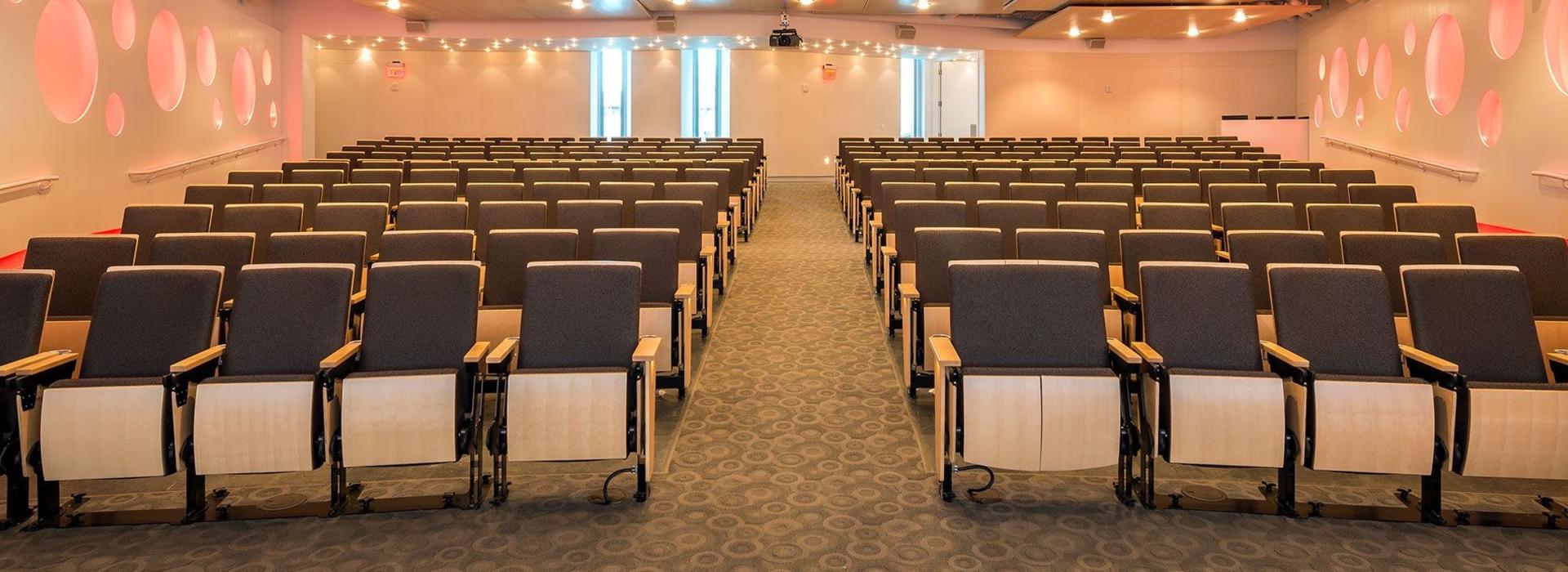
Grand Rounds
Series Overview
The series is designed to connect emerging science with psychiatric practice. Lectures allow for presentation by experts; Q&A allows for extensive involvement of audience and lends itself to large group of learners/participants.
Series Objectives
- Summarize updates in diagnosis, treatment and research for various medical conditions.
- Compare diagnostic and treatment options with team members.
- Discuss appropriate strategies to address patient or team-based issues.
Accreditation Statement FY25

American Medical Association (AMA)
The University of Minnesota, Interprofessional Continuing Education designates this live activity for a maximum of 1.5 AMA PRA Category 1 Credits™. Physicians should claim only the credit commensurate with the extent of their participation in the activity.
Other Healthcare Professionals
Other healthcare professionals who participate in this CE activity may submit their statement of participation to their appropriate accrediting organizations or state boards for consideration of credit. The participant is responsible for determining whether this activity meets the requirements for acceptable continuing education.
How to record attendance and claim credits
You must record your attendance and claim credit from each session within 24 hours of it ending. You can do so by:
OR
2. Claiming your credit online (by signing in to your CE portal account)
How to access your transcripts
Your attendance and corresponding CE credit for participating in Regularly Scheduled Series are recorded and available for you to access anytime.
-
Sign into your CE Portal account at z.umn.edu/CEPortal
-
Click “My CE” in the top menu bar
-
Click on “Transcript” where you can filter by date range to view your transcript record. Credits are listed by Credit Type so be sure to review all pages of your transcript.
You can opt to download or email a copy of your transcript from this screen.
OR
If you have the CloudCMEapp, ensure you are signed into your existing account. Select“My Transcript” and then select view or email. Be sure to check your transcript regularly to ensure your credits are being properly recorded; contact rsc@umn.edu if you notice any discrepancies.
The CE Portal is a new platform to UMN and will not contain historical records; you will only see RSS records for July 1, 2021 and forward on your transcript in addition to any attendance information that you have recorded for conferences and online learning that you have completed since January 1, 2021. Records are specific to CE courses provided by University of Minnesota Office of Continuing Professional Development.
Helpful hint – you can optionally upload any of your CE documents you have received and utilize your CE Portal account to store your overall CE records by selecting the “Upload Files” option within the Transcript. Once you upload your CE documents, they will automatically append to your Transcript report providing you with a convenient place to record all of your CE information.
FY25 Lecture Series
August 7, 2024
Dr. Alexander (Sandy) Simpson is a senior scientist at the Centre for Addiction and Mental Health (CAMH) and holds the Research Chair in Forensic Psychiatry at CAMH and the University of Toronto.
He is also a full professor in the Division of Forensic Psychiatry within the Department of Psychiatry at the University of Toronto.
He has served in directorial and advisory roles on multiple national and international forensic organizations. He is a member of the editorial board of Criminal Behaviour and Mental Health, the Canadian Journal of Psychiatry, Frontiers in Psychiatry, British Journal of Psychiatry Open, International Journal of Forensic Mental Health, Rassegna Italiana of Criminologia and the International Journal of Risk and Recovery. He is a member of the Council of Reviewers of the Canadian Institutes of Health Research (CIHR).
He has over 140 refereed papers in the scientific literature, as well as one book, many book chapters and monographs. He is an occasional columnist for The Globe and Mail. Read more.
Talk Title: The Evolution and Implementation of Culturally Competent Care in Forensic Psychiatry in Canada
Following the talk, learners will be better able to:
- Understand the concepts of cultural competence and cultural safety as applied to forensic mental health care
- Understand the origins of these terms and the challenge they present to practice
- Understand a Canadian example of how to tackle these issues at clinical and service levels.
September 4, 2024
Velma McBride Murry, PhD
Dr. Velma McBride Murry, Associate Provost, Office of Research and Innovation, holds the Lois Autrey Betts Endowed Chair, and is a University Distinguished Professor in Departments of Health Policy [Vanderbilt School of Medicine] and Human and Organizational Development [Peabody College]. She is Past President of the Society for Research on Adolescence and incoming President of The International Consortium of Developmental Science Societies. McBride Murry is one of the 100 elected members to the 2020 Class of the National Academic of Medicine. She was recently appointed to the National Institutes of Health National Advisory Mental Health Research Council. Her research examines the significance of context to everyday life experiences of African American families and youth, focusing on processes through which racism, and other social structural stressors, cascade through families to influence parenting and family functioning, developmental outcomes, and adjustment among youth, during critical developmental periods from middle childhood through young adulthood. Learn more.
Talk Title: Advancing Behavioral Health Equity through Strength-Based, Culturally Tailored Family-Centered Programs
Following the talk, learners will be better able to:
- Develop greater awareness of system and interpersonal barriers and facilitators of behavioral health help seeking behaviors among Black/African American families
- Gain insights on ways to leverage culturally strength-based assets to address behavioral health disparities for Black/African American adolescents and caregivers.
October 2, 2024
Richard Martinez, MD
Director, Forensic Psychiatry Services and Training Chair Professor at UC Denver, Anschutz School of Medicine
November 6, 2024
Mark George, MD
Director Magnetic Brain Stimulation Laboratory Medical University of South Carolina
Dr. Mark George built a campus-wide research brain imaging division and the brain stimulation laboratory in the Department of Psychiatry. As an undergraduate student in philosophy at Davidson College, Dr. George began studying the relationship between mind and brain, or brain/behavior relationships. He has continued this interest throughout his career with a focus on using brain imaging and brain stimulation to understand depression and devise new treatments. He was one of the first to use functional brain imaging during normal emotions as well as in depression and mania. He has grown the science of brain stimulation, both in terms of how the treatments work in the brain, and in critically evaluating their therapeutic applications, especially in treating depression. He has been continuously funded by NIH and other funding agencies since his fellowships. He has received numerous national and international awards. In 2009 U.S. News and World Report named him one of 14 ‘medical pioneers who are not holding back’. He has published over 400 scientific articles or book chapters, and has written or edited six books. Learn more.
December 4, 2024
More information to follow.
February 5, 2025
Corinde E. Wiers, PhD, is an Assistant Professor of Psychiatry at Perelman School of Medicine University of Pennsylvania. The Wiers Lab at Penn focuses on cognitive and neurobiological processes involved in alcohol use disorder (AUD) using PET and MRI neuroimaging. The Wiers Lab currently investigate the effects of metabolic ketosis on brain energetics and alcohol consumption in AUD (funded by an NIH K99/R00 Pathway to Independence and NARSAD Young investigator grant). Learn more.
March 5, 2025
Carolyn Black Becker, PhD, APBB is a Professor of Psychology at Trinity University and licensed clinical psychologist who specializes in the treatment of PTSD, OCD, anxiety disorders, and eating disorders. Dr. Becker completed her PhD at Rutgers University, her clinical internship at Brown University, and her postdoctoral fellowship at Dartmouth Medical School. She is board certified in behavioral and cognitive therapy, and specializes in the compassionate and individualized application of evidence-based interventions. Dr. Becker co-authored Exposure for Eating Disorders published by Oxford University Press and Cognitive Behavior Therapy for PTSD: A Case Formulation Approachby Guilford Press. She is a fellow of the Academy for Eating Disorders, the Association for Behavioral and Cognitive Therapies, and the Association for Psychological Science; she is also a past residential fellow of the Center for Advanced Study in the Behavioral Sciences at Stanford University. Dr. Becker is a past president of both the Society for a Science of Clinical Psychology and the Academy for Eating Disorders. She has received numerous awards including the Lori Irving Award for Excellence in Eating Disorders Prevention and Awareness granted by the National Eating Disorders Association and the Academy for Eating Disorders Research-Practice Partnership Award. Learn more.
April 2, 2025
Roger D. Weiss, MD
Professor of Psychiatry at Harvard Medical School and Chief of the Division of Alcohol, Drugs, and Addiction at McLean Hospital in Belmont, Massachusetts
Dr. Weiss’ career has focused on treatment and clinical research with substance-dependent patients. He has received numerous NIH grants, including for developing integrated group therapy, an evidence-based treatment for co-occurring bipolar and substance use disorders, and leading a multi-site treatment study of prescription opioid dependence. He has authored over 300 publications, including several books, and was vice chair of the American Psychiatric Association Task Force on Practice Guidelines for Patients with Substance Use Disorders.
Dr. Weiss was named a member of honor by the Spanish Society for Dual Disorders in 2011, and has received numerous other awards, including the H. David Archibald Award for Outstanding Research and/or Practice in the Addictions from The Centre for Addiction and Mental Health in Toronto (2007), the Jack H. Mendelson Research Award from McLean Hospital (2012), and the Dan Anderson Research Award from the Hazelden Foundation (2012). Learn more.
April 16, 2025
MSTP Student - Andrea Maxwell
May 7, 2025
Jennifer Freeman, PhD is the Director of the Pediatric Anxiety Research Center (PARC) at Bradley Hospital. Dr. Freeman is also Professor (Research) of Psychiatry and Human Behavior at The Warren Alpert Medical School of Brown University, Associate Director of the Postdoctoral Research Fellowship Program in the Clinical Psychology Training Program at Brown Medical School, and Associate Director of Research at Bradley Hospital. Learn more.
June 4, 2025
Andrew Furman, MD
Professor and Eminent Physician and Associate Dean for Faculty Affairs at the Emory University School of Medicine
Dr. Furman received his Bachelor of Arts from Williams College, majoring in Religion and the History of Ideas, and his Doctor of Medicine from the Emory University School of Medicine. He did his internship in internal medicine at the University of Washington and his psychiatric residency at Emory, culminating in a chief residency at the Grady Health System. Dr. Furman is a psychiatrist and psychoanalyst, as well as a small group advisor in the Emory School of Medicine. He teaches extensively in the School of Medicine- both medical students and psychiatric residents, as well as in the Leadership Development Program of the Goizueta Business School of Emory University and in the Emory University Psychoanalytic Institute. Additionally, he is an affiliated faculty member of the Department of Comparative Literature in Emory College and the Psychoanalytic Studies Program of the Laney Graduate School of Emory University. Scholarly interests include the use of the humanities in medical and health education, the development of the medical professional, and psychotherapy and psychoanalytic pedagogy. Learn more.
Event Details
Occurs monthly on the 1st Wednesday of the Month (except January and July)
11:00 AM - 12:30 PM, (CT) Hybrid
For questions regarding this RSS, contact Daniel Franks, dfranks@umn.edu or Natalie Metzger, metzg067@umn.edu
Grand Rounds Videos
Recordings of past Psychiatry & Behavioral Sciences Grand Rounds lectures are available online. With permission, new recordings are added a day or two after each lecture.